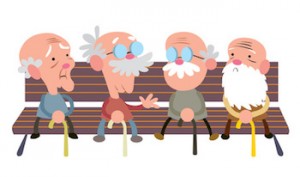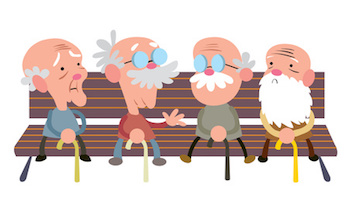 I would have liked to have had more time to hang out with friends and family during my working years. I enjoyed catching up with people I cared about, but I had too many ongoing responsibilities at work and at home so there just wasn’t enough time to hang out, at least to my satisfaction.
I would have liked to have had more time to hang out with friends and family during my working years. I enjoyed catching up with people I cared about, but I had too many ongoing responsibilities at work and at home so there just wasn’t enough time to hang out, at least to my satisfaction.
As I climbed my career ladder I got more and more wrapped up in job-related tasks and had even less opportunity to hang out with those I cared about. During my fifties, as retirement began to loom as a reality, I fantasised about being able to connect more often with others I cared about. It seems the less hang out time I had the more I wanted it.
What is it about hanging out with each other that is so positive, at least for those of us who are not attracted to being hermits or monastics? I think it’s about the need to be part of something bigger than ourselves, to be able to give and receive support, and to get feedback from others we respect that helps us clarify our sense of self and how we want to live.
As we age we have to reconsider who we can hang out with. Work relationships shrink as time passes as do family and friendship circles, due to geographic mobility and mortality. Those who remain become all the more meaningful because we share a common history which makes it easier to relate and share the meaning of our lives.
Given the inevitable reality of losing friends and relatives we need to add others to our hanging out group. If we don’t we will soon find ourselves with a drastically shrinking group of others to relate to. We need to connect with others at our life stage and we also need to create positive connections with those younger than ourselves so we can expand our sense of self and the world around us.
Fostering positive connections combats isolation, which is well documented as a major factor associated with depression and other negative health issues. Being in meaningful touch with those around us is the antidote to loneliness. For this reason alone it is well worth the effort required to make it an ongoing part of our lives.
The challenge is to figure out how to make it happen. My wife and I moved half way around the world fifteen years ago. Within a short time we realised that we missed the rich support group of friends that we had developed where we used to live. Our first response was to get on the phone, write emails and, in any other way that we could, keep the connections from back home alive. We also encouraged people to come and visit us.
However, as important as it was to maintain these relationships, it soon became clear that it was even more important to develop friendships in our new community. We realised that we needed to find people we wanted to hang out with and with whom we could create caring relationships.
It took some effort, requiring us to reach out in different ways to make it happen. We joined two groups whose purposes included bringing older people together to socialise. One is a luncheon club that meets every other week to listen to interesting speakers. The other is a retired persons’ social group that meets formally once a month to hear a speaker and to promote opportunities for members to chat. It also sponsors a variety of activities for members who have similar interests—e.g., four wheel driving trips into the mountains, walking, bicycling, luncheon, theatre, and table games groups. We have made some good friends as a result of participating in these groups.
We also decided to do use skills we had developed during our working years to get involved with volunteer work. We have run parenting workshops, counselled individuals experiencing problems with their partners or children, and helped organisations improve their abilities to set goals, communicate better, and work through conflicts,. We have become acquainted with many people and found a few friends in the process. Volunteering has enabled us to meet interesting people and get the satisfaction of doing a bit of good work.
In addition we joined the local croquet club, which is mainly played by older people, partly to expand our connections with people in our community and partly to learn a new sport that women can play on an equal basis with men. We love this shared challenge and we have indeed developed some caring relationships with other croquet players.
If we understand how negative isolation can be and how important being able to hang out with caring others is to our well being we need to reach out and do everything we can to maintain and build meaningful relationships as we age. The sooner we do it the better. It only gets harder the longer we wait.
By Mike Milstein. Read more here.









Join the Discussion
Type out your comment here:
You must be logged in to post a comment.